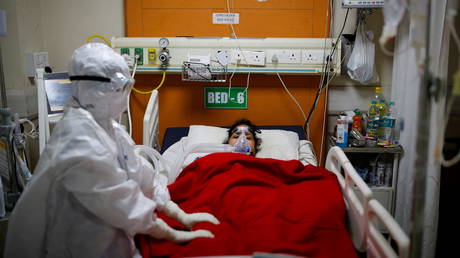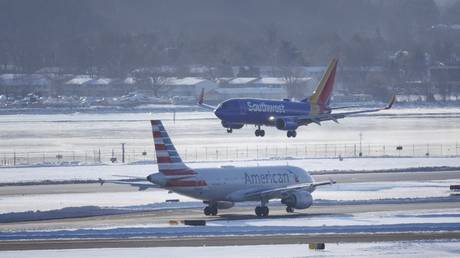
The Indian government has reportedly called on social media platforms to scrub all posts that refer to the “Indian variant” of the coronavirus, after the country’s Health Ministry argued the term is misleading and “without basis.”
New Delhi’s information technology ministry wrote to social media companies on Friday to urge them to remove any content that uses the phrase, insisting there is no scientific reason to link the viral mutation to India, according to a letter obtained by Reuters and local media.
“It has come to our knowledge that a false statement is being circulated online which implies that an ‘Indian variant’ of coronavirus is spreading across the countries. This is completely FALSE,” the letter said, referring to a variant identified by the World Health Organization as B.1.617, which was first reported in India.
A government source told Reuters on condition of anonymity that the missive was sent to make it “loud and clear” that that the term is harmful to India’s image and gives a false impression that the mutation is specific to the country.
Earlier this month, the Indian Health Ministry issued a statement criticizing media reports that referred to B.1.617 as the “Indian variant.” The ministry noted that the WHO’s May 10 report on the mutation did not use the phrase, though the document does state that “viruses in the B.1.617 lineage were first reported in India.”
Singapore has made a similar demand to social media platforms, ordering Facebook and Twitter to leave corrections on posts that claim a new variant had been detected in that country. The request came after Delhi’s Chief Minister Arvind Kejriwal urged for a ban on flights to Singapore in a Twitter post, alleging a “new form of Corona” that is “very dangerous for children” was discovered there.
While the WHO has been reluctant to tie Covid-19 or any of its variants to geographical locations over concerns of stigma, media outlets have frequently done so throughout the health crisis, with numerous reports citing the “UK,” “Brazil” or “South Africa” variants of the coronavirus, some all at once.
During earlier stages of the pandemic, controversy also erupted over the term “China virus,” referring to the fact the pathogen was first detected in the Chinese city of Wuhan. Former US President Donald Trump, who used the phrase liberally, was slapped with a lawsuit on Friday by a Chinese-American group, which said his words fueled violence against Asians and caused widespread “emotional distress.”
In an apparent effort to de-stigmatize B.1.617, Scottish First Minister Nicola Sturgeon said she would no longer speak of an “Indian variant” and would now refer to it as “April 02” during a Friday press briefing. While she nonetheless went on to use the phrase again during the same presser, Health Secretary Humza Yousaf insisted the name-change was appropriate, saying it is “important for us not to allow this virus to divide us as communities and people,” according to Sun reporter Chris Musson.
However, Sturgeon left some observers confused when she referenced the “Kent variant” – another term for a mutation first spotted in the UK – moments after swearing off the location-based label in India’s case.
Like this story? Share it with a friend!




